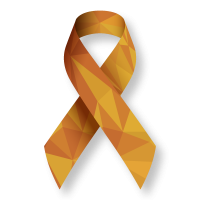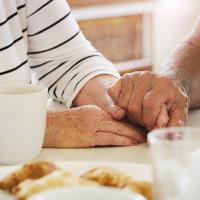It can be difficult to know what to say when someone you know is diagnosed with cancer. When you care about someone, you want them to feel loved and supported, however, a poor choice of words may make them feel more anxious or alone, so it's important to be cautious and thoughtful with your response. A simple expression of concern or willingness to help is often the most meaningful.
In this article, we look at what to say - and what not to say - when someone you care about is diagnosed with cancer.
- Consider Their Relationship to You
- Helpful Tips for Reacting to Someone Sharing Their Cancer Diagnosis
- Examples of What Not to Say to Someone Who Is Diagnosed with Cancer
- Examples of What to Say When Someone Has Cancer

Consider Their Relationship to You
The person's relationship with you makes all the difference and you should adjust your response depending on whether you're family, close friends, co-workers, or acquaintances. Considering the ways you're connected can help shape your approach.
Immediate Family
If an immediate family member is diagnosed with cancer, you'll experience your own range of emotions. You may feel fear, sadness, and anger. For the moment, you'll have to put your feelings aside so you can support your loved one. They are likely coping with intense feelings, such as anxiety or depression.1
Take some time to consider how your response might affect them. If you need to work through your own emotions, do so separately. Take this opportunity to affirm your love and support. You may have to take on the role of a primary caregiver, so your initial response to the situation matters.
Extended Family
An extended family member's diagnosis may impact you in different ways. It might not change your day-to-day life, but it will affect your family long-term. It's important to show how much you care and offer help to those who will become primary caregivers.
Close Friend
Learning a close friend has cancer will likely spark a range of emotions. You know your friend, so you may know what response will be the most helpful for them. Let your knowledge of your friend shape your response. You may also want to extend your support to your friend's family. It's a good idea to take some time to process your feelings and learn about your friend's diagnosis.2
Co-Worker or Boss
The dynamics between co-workers or bosses and employees are a bit more complicated. A work colleague can be anything from a distant acquaintance to a close friend. You may have known them for years or just a few weeks. It's important to tailor your response to the nature of your relationship.
A Friend or Acquaintance in Your Extended Network
It can be even more challenging to know what to say if a friend or acquaintance in your extended network is diagnosed with cancer, as it can be hard to predict the feelings they're experiencing. You can respond in a supportive and caring manner. It may not be appropriate to offer your help or ask further questions about the diagnosis. Instead, extend your sympathy.

Helpful Tips for Reacting to Someone Sharing Their Cancer Diagnosis
When someone shares their cancer diagnosis with you, you may be caught off guard. Even if you're experiencing a range of emotions, it's vital to respond in a careful, considerate, and empathetic manner. Here are some useful tips on what to say to someone diagnosed with cancer:
1. Take a Pause
First, take a pause. Your initial reaction might not be what you want to share. Showing fear, shock, or panic may upset your loved one. Anything you say without thinking could have a long-term effect on them. Filter yourself, and take a moment to think before you speak.
2. Show Empathy
One of the most important things you can do is show empathy. If appropriate for your relationship, tell them how much you love and care about them. Empathize with their feelings, without pretending to understand them. Refrain from comparing their experience to someone else's — no two cancer patients' journeys are the same. Offer yourself as someone they can talk to whenever they need.
3. Share Positivity but Not False Hope
If the situation is dire, it's not helpful to point that out. Instead, offer words of comfort and encouragement. Say things like, "Try to keep your head up." It can be tough to find a balance between positivity and false hope, but it's important to understand the distinction. Try not to say things like:
- "It'll be OK."
- "You'll be healthy again soon."
- "Someone else I know went into remission."
While these statements might seem uplifting, they may come across as insincere or make the individual feel hopeless when there isn't a quick fix.
4. Don't Push Them to Share
When you first learn of someone's cancer diagnosis, you might find yourself with a lot of unanswered questions. Don't push them to share more than they're ready to, and refrain from asking too many personal questions. Let them guide the conversation, sharing as much as they're willing. It can be challenging for them to bring up their diagnosis, let alone discuss the details of their condition.
Over time, they may grow comfortable sharing with you. If you'd like to learn more, ask for permission to ask more questions. Make sure they understand it's OK for them not to share with you if they're uncomfortable doing so. Remember, they do not owe you personal information.
5. Make a Plan to Stay in Touch
Cancer treatment is a complicated and lengthy process that can take months or years beyond the initial diagnosis.3 Those with cancer sometimes feel they lose support over time. Make a plan to stay in touch throughout their journey. If the patient is a close family member or friend, you could be an integral part of the process, offering caregiving services or supporting the primary caregivers.
If the patient has a more distant connection to you, remind yourself to check in from time to time. Even a brief, general message of support every few weeks or so could make a big difference.
6. Show You Care
Above all else, find ways to show that you care. Lend an ear if they need to vent their feelings. Sit with them if they need company. Cook meals or run errands to lighten the burden. Send them flowers to brighten their day. Reach out on a regular basis to reaffirm your support. You can make a real impact by being present and showing how much you care.

Examples of What Not to Say to Someone Who Is Diagnosed with Cancer
Though every circumstance is different, a few "don'ts" are universal. Here are some of the things to refrain from saying when you learn of someone's cancer diagnosis. These comments may do more harm than good, so they're best left unsaid. Consider alternatives for the following:
1. "I Know How You Feel"
When someone tells you about their cancer diagnosis, avoid proclaiming you know how they feel. Even if you have had cancer, everyone's experience is different, and the comparison may likely come up short. This is not about you. Trying to put yourself in their shoes will only diminish what they're going through and discourage them from sharing their feelings. Instead, listen to them.
2. "I Know So-And-So Who Had the Same Diagnosis"
Again, everyone's experience with cancer is different. Drawing a comparison to someone else with the same diagnosis is not helpful. Maybe the person you knew recovered. While it may seem uplifting to share this, it could also be a source of false hope, causing future disappointment if your loved one's trajectory is different.
On the other hand, if the other person you knew was not able to recover, learning this may make your friend or family member feel more anxious and hopeless. In either case, it's better to leave someone else's story out of the conversation.
3. "Don't Worry"
It's often a knee-jerk reaction when someone tells you they're struggling to say that everything will be fine. When it comes to cancer, no one can predict how things will turn out. A comment like "don't worry" can seem dismissive and insincere. While you don't want to contribute to their feelings of despair, it also is not a good idea to be an unhelpful cheerleader.
Replace comments like these with more comforting remarks, such as, "I'll do what I can to help you get through this." This is a hopeful statement that acknowledges the severity of the situation rather than dismissing it. Make room for their feelings instead of telling them not to worry.
4. "You Can Beat This"
While telling a cancer patient they can "beat" cancer may seem empowering, it often isn't. This puts the burden on the cancer patient at a time when they likely feel hopeless and exhausted. It's better to extend sympathy than to devalue their feelings with meaningless positivity.
5. Baseless Advice
Remember, you are not their doctor. Offering advice on what to do is overstepping. Contain the urge to tell them how they should eat, what treatments they should seek, or what exercises they should do. Only offer advice if they ask for it. Otherwise, leave it up to the health care professionals. You might point them in the direction of educational resources, such as well-researched healthy living guides for those with cancer.4
6. Anything Patronizing
Patronizing comments are those that may seem helpful but are actually condescending. A patronizing comment could take many forms. Trying to find a silver lining can come across as patronizing. Pointing out weight loss as a positive side effect, for example, is not OK.
It's not your place to find positives in the situation, and your comments might seem like backhanded compliments. Offering unsolicited advice is also patronizing. Before you say anything, ask yourself if your comment could seem belittling or demeaning.
Examples of What to Say When Someone Has Cancer
If you're wondering what to write to someone who has cancer, you might feel stuck. While knowing what not to say is important, you'll need to say something. Silence could be mistaken for apathy. Here are some possible responses for when you learn someone has cancer:
1. Nothing - Listen and Let Them Talk
It might feel uncomfortable at first, but sometimes the best thing you can do is stay quiet for a moment. Your friend or loved one may need someone to listen and sympathize with their feelings. Give them ample time to talk if that's what they want to do. It can also help to simply be present, offering your company during this difficult time. Even if you have no idea what to say, be there for them.
2. "Let Me Help You With..."
You might feel eager to extend your help. Offer concrete suggestions for how you can be helpful, and follow through. You might offer your help to their primary caregivers, as caregiving can become a major source of stress. Remind them you're available, and you do not expect them to return the favor. Suggest specific tasks, such as:
- Babysitting
- Getting groceries
- Picking up prescriptions
- Cooking dinner
- Giving company during treatment
- Gathering helpful resources
- Making phone calls
Sometimes, it may be appropriate to extend a helping hand whether they ask you to or not. People often struggle to ask for help, even if they need it. For example, you might drop off a meal without asking if it's necessary beforehand. Be sure not to overstep, however, and give them plenty of personal space. Receiving help can be challenging. Your offers of help might be rejected at first — keep trying, especially when it seems help is necessary.
3. Tell a Joke You Know They'll Enjoy
It might feel like an inappropriate time for comedy, but laughter can feel restorative. If the cancer patient is someone you know very well and you're familiar with their sense of humor, you might want to make a joke. When everything is so grave and serious, the occasional laugh can do wonders for someone's mental health. Of course, you'll have to proceed with caution and avoid telling jokes during the most sensitive moments.
4. "What Day Works for a Visit?"
Create a plan to be there for them when they're available. Plan times to visit them or schedule activities together. Try not to get offended if they have to cancel on you. They might make plans in advance and not feel up to it the day of. The effects of cancer are hard to predict.
5. "Did You See...?"
Try to maintain a sense of normalcy. Cancer can be all-consuming and take up a lot of someone's time and energy. They might want to talk about anything else sometimes. Ask if they've seen the latest episode of a show you both enjoy. Ask about their pets, their hobbies, and other everyday topics. Make conversation about things not related to their diagnosis.
6. "I Love You" or "I Care About You"
The best thing you can say is, "I love you" or, "I care about you." When in doubt, reaffirming your love and support is always a good idea. Now more than ever, they'll need to feel loved. Remind them you're thinking about them. A simple, "I love you, and I'm here for you," can go a long way.
When Someone You Know Has Been Diagnosed With Cancer, Consider Your Words Carefully
When someone you know has been diagnosed with cancer and you want to offer your support, it's important to be thoughtful, exercising careful consideration before you speak. Avoid a response that could come across as patronizing, condescending, or dismissive. Instead, let them lead the conversation, make a plan for how you can help, and affirm how much you care about them.
If they've been diagnosed with bladder cancer, we recommend you take a moment to browse our collection of educational articles and bladder cancer resources. We cover a range of topics designed to help patients, caregivers, and friends better understand the disease, alongside wellbeing and considerations after treatment.
References
- National Cancer Institute. Feelings and Cancer. https://www.cancer.gov/about-cancer/coping/feelings
- American Society of Clinical Oncology. Supporting a Friend Who Has Cancer. https://www.cancer.net/coping-with-cancer/talking-with-family-and-friends/supporting-friend-who-has-cancer
- American Society of Clinical Oncology. Managing Your Care. https://www.cancer.net/navigating-cancer-care/managing-your-care
- American Society of Clinical Oncology. Healthy Living After Cancer. https://www.cancer.net/survivorship/healthy-living/healthy-living-after-cancer






